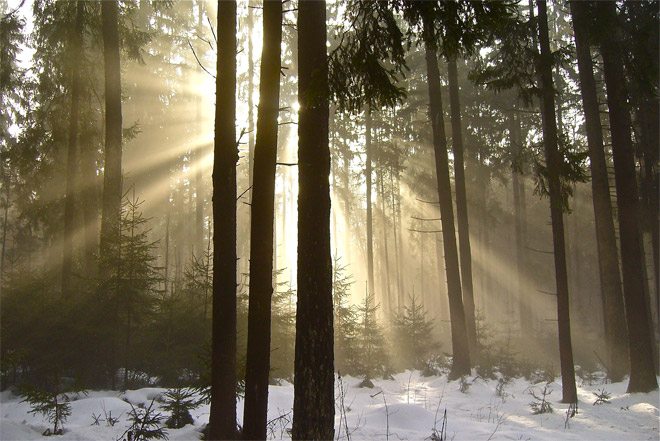By Lisa Bland, Publisher/Editor-in-Chief –
Dear Readers,
Winter forces us inside on many levels—cushioned inside layers of wool and down clothing to brave the elements; inside our warm homes with creative projects, soups, and teas brewing; or into a natural connection with the silence of our inner being. This season can be a time of withdrawal from the pace of busier times. With less to reflect upon externally, our attention can be drawn inside, into silence.

And what of silence? “Silence is golden,” it is said, translated by poet Thomas Carlyle, in 1831 in Sartor Resartus. The Swiss inscription actually says: Sprecfien ist silbern, Schweigen ist golden (Speech is silvern, Silence is golden).
Our world is increasingly noisy. Our collective spaces are filled with sound—endless traffic, construction, and industrial noise punctuated by sirens and the busy sounds of progress. Public spaces are buzzing with noise, ambient music, or blaring TVs. Our homes are filled with sounds of music, TV, radio, and podcasts, often to drown out external noises in urban settings, or maybe because we are uncomfortable with or unaccustomed to silence.
And what is the consequence of all this noise? It turns out it has measurable and serious effects on our well being.
According to the World Health Organization (WHO), levels of traffic noise in urban environments have serious consequences for health and sleep quality. A 2011 WHO report presents overwhelming evidence that exposure to environmental noise has adverse effects on the health of the population. Studies show noise pollution can lead to high blood pressure, heart attacks, and increased cortisol levels.
Attending to constant noise interruptions and stimuli in our environments has been shown to stress the prefrontal cortex, which is involved in thinking, decision-making, and problem-solving. WHO also reports that noise affects learning, reading, problem solving, and motivation. Social and emotional development in children and their cognitive abilities are diminished in noisy homes, or when living or going to schools near noisy highways or airports.
Alternatively, research has shown that silence can release tension in the brain and body. A 2006 study in the journal Heart found that silence was more relaxing than listening to “relaxing” music, with measurable positive effects on blood pressure and circulation in the brain.
Silence may also help our brains regenerate. A 2013 study on mice titled, “Is silence golden? Effects of auditory stimuli and their absence on adult hippocampal neurogenesis,” compared the effects of ambient noise, white noise, and silence on the brains of mice and discovered that daily silence led to the development of new cells in the hippocampus, associated with learning and memory.
In his book, Pursuit of Silence: Listening for Meaning in a World of Noise, George Prochnik explores the meaning of noise and silence in our modern world, suggesting that even though we can’t escape it, practising inner silence and developing public spaces where silence is promoted can lead to positive outcomes for our society and individual health. See more at http://www.nytimes.com/2010/05/30/books/excerpt-in-pursuit-of-silence.html.
Attention restoration theory (ART) proposes that people can concentrate better from being quiet in nature or even looking at nature scenes. Perhaps the saying should be changed to, “Human silence is golden.”
Bryan Pijanowski, an ecologist and director of Purdue’s Center for Global Soundscapes (PCGS) in Indiana, believes the sounds of our planet are important to its survival, and are a valuable part of our connection to place. As the hum of motors in our urban realities overtakes the natural sounds of wind, water, and birdsong, humans lose their acoustic link to the natural world.
Pijanowski proposes that the health of landscapes can be measured by an acoustic reflection of their patterns and processes. The Vanishing Soundscapes Project at PCGS is collecting natural soundscape recordings in as many of the planet’s biomes as possible. See https://centerforglobalsoundscapes.org/vanishing-soundscapes/. The project aims to create an archive of natural soundscape recordings as an acoustic fossil record of the varied sounds occurring in Earth’s diverse biomes. It charts changes in these regions in correlation with mapping and population data, and produces visual tools alongside the soundscapes to enhance understanding and awareness of their value.
I’ve been lucky enough to live rurally or be close to quiet areas, and have developed an appetite for silence. Working outside doing birdsong research has attuned my ears to the symphony of natural sounds. Being quiet and listening brings a depth of connection with other life forms and the sounds of natural elements. It can feel like a melody of sorts, where the natural world brings the song with all its players and our own being is the instrument through which the sounds play.
When we rest in silence we find restoration. Whether listening to our own breath and returning to the inner rhythms of our biological, internal being; or merging into the stillness where the natural world comes alive and meets us; or finding protection and a place to hide when neither the energy is available nor clarity of action has fully formed, silence may be our greatest resource in a world flooded by noise.
In the Cariboo, we still live in and can access wilderness where silence dwells. Whether you become enthralled in the beauty of the snow-covered landscape, enjoy the silence of carving through deep powder, or nestle indoors reading a book or absorbed in a creative project, I wish you glimpses of golden silence in the long, cold winter.

1 Comment
In my 90 years of life I learned long ago the value of silence, and the gentle sounds of nature. So I left my birthplace of central London and moved to rural Canada. But I have also learned of the power of love toward all animals, and the amazing intelligence of so many we considered lowly, as another understanding of inner peace. And I continue to learn.